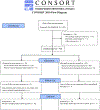Feasibility and acceptability of home-based strength training in endometrial cancer survivors
- PMID: 33675013
- PMCID: PMC9362896
- DOI: 10.1007/s11764-021-00990-3
Feasibility and acceptability of home-based strength training in endometrial cancer survivors
Abstract
Purpose: Physical activity is important for healthy cancer survivorship, yet many endometrial cancer survivors do not participate in recommended muscle-strengthening activity. The purpose of this study was to determine the feasibility of home-based muscle strengthening activity in endometrial cancer survivors.
Methods: Forty post-treatment endometrial cancer survivors were enrolled in a randomized trial, of twice-weekly home-based strength exercise versus wait-list control. The intervention included educational materials, exercise equipment (dumbbells, resistance bands), and support/feedback via video coaching sessions. Participants completed the exercises twice per week for 10 weeks, with a 5-week follow-up period. Feasibility was measured by program adherence, as well as safety of and satisfaction with the study.
Results: On average, participants were 60.9 years old (SD = 8.7), had a BMI of 39.9 kg/m2 (SD = 15.2), and were 2.9 years (SD = 1.2) since diagnosis. The majority (83%) had stage I disease at diagnosis. Seventy-five percent adhered to the exercise prescription of twice/week, with 85% of participants missing fewer than 3 of the workouts. Forty percent of participants continued workouts during the 5-week follow-up. Participants were highly satisfied with intervention. No injuries or adverse everts occurred.
Conclusion: This home-based program was feasible in endometrial cancer survivors. While adherence was measured, future research should focus on long-term maintenance of exercise and should explore progressions and modifications of exercises at a distance for various abilities.
Implications for cancer survivors: Muscle strengthening activities are recommended for all cancer survivors. This study shows that a home-based muscle strengthening exercise is feasible in endometrial cancer survivors.
Keywords: Endometrial cancer; Exercise; Home based; Muscle; Strength; Survivorship.
© 2021. The Author(s), under exclusive licence to Springer Science+Business Media, LLC part of Springer Nature.
Conflict of interest statement
Figures


Similar articles
-
Improvements in strength and agility measures of functional fitness following a telehealth-delivered home-based exercise intervention in endometrial cancer survivors.Support Care Cancer. 2022 Jan;30(1):447-455. doi: 10.1007/s00520-021-06415-2. Epub 2021 Jul 25. Support Care Cancer. 2022. PMID: 34304292 Free PMC article. Clinical Trial.
-
Feasibility, acceptability and effects of multimodal pelvic floor physical therapy for gynecological cancer survivors suffering from painful sexual intercourse: A multicenter prospective interventional study.Gynecol Oncol. 2020 Dec;159(3):778-784. doi: 10.1016/j.ygyno.2020.09.001. Epub 2020 Oct 1. Gynecol Oncol. 2020. PMID: 33010968 Clinical Trial.
-
Online-delivered resistance exercise intervention among racially diverse breast cancer survivors: Feasibility, acceptability, and exploratory outcomes of B-REP.Support Care Cancer. 2024 Aug 1;32(8):565. doi: 10.1007/s00520-024-08769-9. Support Care Cancer. 2024. PMID: 39090218 Clinical Trial.
-
Feasibility and acceptability of an mHealth, home-based exercise intervention in colorectal cancer survivors: A pilot randomized controlled trial.PLoS One. 2023 Jun 22;18(6):e0287152. doi: 10.1371/journal.pone.0287152. eCollection 2023. PLoS One. 2023. PMID: 37347792 Free PMC article. Clinical Trial.
-
Effects of a 12-week resistance and aerobic exercise program on muscular strength and quality of life in breast cancer survivors: Study protocol for the EFICAN randomized controlled trial.Medicine (Baltimore). 2019 Nov;98(44):e17625. doi: 10.1097/MD.0000000000017625. Medicine (Baltimore). 2019. PMID: 31689771 Free PMC article.
Cited by
-
Improvements in strength and agility measures of functional fitness following a telehealth-delivered home-based exercise intervention in endometrial cancer survivors.Support Care Cancer. 2022 Jan;30(1):447-455. doi: 10.1007/s00520-021-06415-2. Epub 2021 Jul 25. Support Care Cancer. 2022. PMID: 34304292 Free PMC article. Clinical Trial.
-
Interventions for weight reduction in obesity to improve survival in women with endometrial cancer.Cochrane Database Syst Rev. 2023 Mar 27;3(3):CD012513. doi: 10.1002/14651858.CD012513.pub3. Cochrane Database Syst Rev. 2023. PMID: 36971688 Free PMC article.
-
Feasibility and Effectiveness of the Exercise Program in Endometrial Cancer; Feasibility and Acceptability Survivorship Trial (EPEC-FAST).Cancers (Basel). 2022 Nov 14;14(22):5579. doi: 10.3390/cancers14225579. Cancers (Basel). 2022. PMID: 36428675 Free PMC article.
-
Key takeaways for knowledge expansion of early-career scientists conducting Transdisciplinary Research in Energetics and Cancer (TREC): a report from the TREC Training Workshop 2022.J Natl Cancer Inst Monogr. 2023 May 4;2023(61):149-157. doi: 10.1093/jncimonographs/lgad005. J Natl Cancer Inst Monogr. 2023. PMID: 37139978 Free PMC article.
-
Feasibility, safety, and adherence of home-based exercise interventions in people diagnosed with cancer: a systematic review.J Cancer Surviv. 2025 Mar 22. doi: 10.1007/s11764-025-01778-5. Online ahead of print. J Cancer Surviv. 2025. PMID: 40119984 Review.
References
-
- Siegel RL, Miller KD, Jemal A. Cancer statistics, 2020. CA-Canceer J Clin. 2020;70(1):7–30. - PubMed
-
- Fader AN, Arriba LN, Frasure HE, von Gruenigen VE. Endometrial cancer and obesity: epidemiology, biomarkers, prevention and survivorship. Gynecol Oncol. 2009;114(1):121–7. - PubMed
-
- Sheikh MA, Althouse AD, Freese KE, Soisson S, Edwards RP, Welburn S, et al. USA endometrial cancer projections to 2030: should we be concerned? Future Oncol. 2014;10(16):2561–8. - PubMed
Publication types
MeSH terms
Grants and funding
LinkOut - more resources
Full Text Sources
Other Literature Sources
Medical

